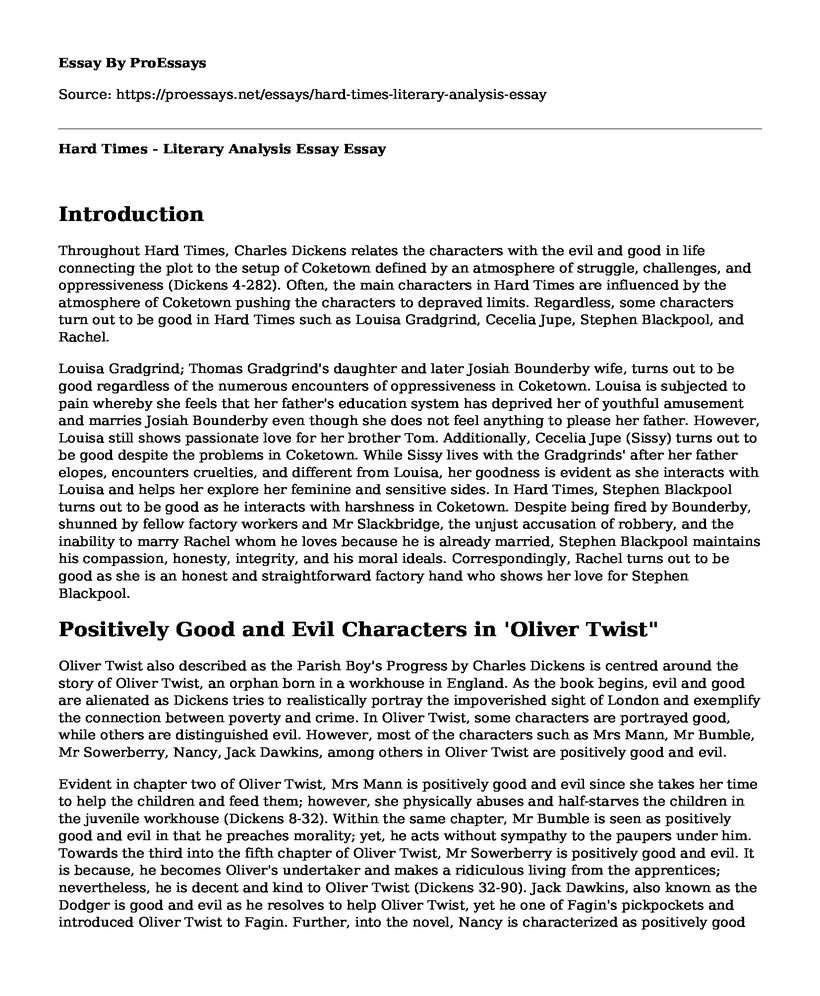Introduction
Throughout Hard Times, Charles Dickens relates the characters with the evil and good in life connecting the plot to the setup of Coketown defined by an atmosphere of struggle, challenges, and oppressiveness (Dickens 4-282). Often, the main characters in Hard Times are influenced by the atmosphere of Coketown pushing the characters to depraved limits. Regardless, some characters turn out to be good in Hard Times such as Louisa Gradgrind, Cecelia Jupe, Stephen Blackpool, and Rachel.
Louisa Gradgrind; Thomas Gradgrind's daughter and later Josiah Bounderby wife, turns out to be good regardless of the numerous encounters of oppressiveness in Coketown. Louisa is subjected to pain whereby she feels that her father's education system has deprived her of youthful amusement and marries Josiah Bounderby even though she does not feel anything to please her father. However, Louisa still shows passionate love for her brother Tom. Additionally, Cecelia Jupe (Sissy) turns out to be good despite the problems in Coketown. While Sissy lives with the Gradgrinds' after her father elopes, encounters cruelties, and different from Louisa, her goodness is evident as she interacts with Louisa and helps her explore her feminine and sensitive sides. In Hard Times, Stephen Blackpool turns out to be good as he interacts with harshness in Coketown. Despite being fired by Bounderby, shunned by fellow factory workers and Mr Slackbridge, the unjust accusation of robbery, and the inability to marry Rachel whom he loves because he is already married, Stephen Blackpool maintains his compassion, honesty, integrity, and his moral ideals. Correspondingly, Rachel turns out to be good as she is an honest and straightforward factory hand who shows her love for Stephen Blackpool.
Positively Good and Evil Characters in 'Oliver Twist"
Oliver Twist also described as the Parish Boy's Progress by Charles Dickens is centred around the story of Oliver Twist, an orphan born in a workhouse in England. As the book begins, evil and good are alienated as Dickens tries to realistically portray the impoverished sight of London and exemplify the connection between poverty and crime. In Oliver Twist, some characters are portrayed good, while others are distinguished evil. However, most of the characters such as Mrs Mann, Mr Bumble, Mr Sowerberry, Nancy, Jack Dawkins, among others in Oliver Twist are positively good and evil.
Evident in chapter two of Oliver Twist, Mrs Mann is positively good and evil since she takes her time to help the children and feed them; however, she physically abuses and half-starves the children in the juvenile workhouse (Dickens 8-32). Within the same chapter, Mr Bumble is seen as positively good and evil in that he preaches morality; yet, he acts without sympathy to the paupers under him. Towards the third into the fifth chapter of Oliver Twist, Mr Sowerberry is positively good and evil. It is because, he becomes Oliver's undertaker and makes a ridiculous living from the apprentices; nevertheless, he is decent and kind to Oliver Twist (Dickens 32-90). Jack Dawkins, also known as the Dodger is good and evil as he resolves to help Oliver Twist, yet he one of Fagin's pickpockets and introduced Oliver Twist to Fagin. Further, into the novel, Nancy is characterized as positively good and evil. For instance, she works for Fagin and returns Oliver Twist after he escapes. Later, she chooses to help Oliver Twist and reveals the Monks' plot against Oliver. Centred around the activities and cruel treatment of people, particularly in London during the mid-19th century, Charles Dickens provides a notable presentation of the events. In the characterization of Oliver Twist, Dickens gives a combination of good and evil actions to explicitly explain the practices with the London streets in the 1830s.
Works Cited
Dickens, Charles. Hard Times: A novel. No. 192. New York: Harper & Brothers, 1854.
Dickens, Charles. The Adventures of Oliver Twist. Ticknor and Fields, 1868.
Cite this page
Hard Times - Literary Analysis Essay. (2023, Mar 28). Retrieved from https://proessays.net/essays/hard-times-literary-analysis-essay
If you are the original author of this essay and no longer wish to have it published on the ProEssays website, please click below to request its removal:
- Literary Essay on Romantic Poets
- The Pollution Caused by Oedipus - Essay Sample
- Marie de France and Chivalric Romance Essay Example
- Are Men and Women Equal in the Brave New World?
- Essay Sample on Motiveless Malignity in Shakespeare's Othello: Iago's Evil Actions
- Joker: A Unique, Complex Antihero and Disruptor - Essay Sample
- Anne Sexton: Poet, Mother, Divorcee, and Star of Literature - Essay Sample







